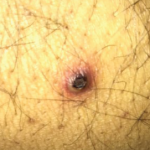NEW YORK (Reuters Health)—Immunosuppressants and anti-TNF drugs do not appear to increase the risk of extracolonic cancers in patients with inflammatory bowel disease (IBD), researchers from Spain report.
IBD patients face an increased risk of colon cancer, and some studies have suggested there might be an increased risk of extracolonic cancer.
Dr. Maria Chaparro from Hospital de La Princessa, in Madrid, and colleagues used data from the Spanish Working Group in Crohn’s and Colitis (GETECCU) prospective ENEIDA registry to investigate the incidence, prevalence and distribution of extracolonic cancer in more than 11,000 IBD patients and their possible association with treatment with immunosuppressants and anti-TNF agents.
Nearly half of the patients had been exposed to immunosuppressants or anti-TNF drugs: 45.8% to thiopurines, 4.7% to methotrexate and 21.6% to anti-TNF drugs, the team reports in The American Journal of Gastroenterology, online May 23.1
During a median follow-up of 98 months (range: 5–608 months), the overall incidence of extracolonic cancer was 0.36% per patient-year. The most prevalent extracolonic cancers were breast cancer (16.8% of the total), prostate cancer (12.3%), lung cancer (9.3%) and nonmelanoma skin cancer (8.8%).
On multivariate analysis, the only two factors significantly associated with a higher risk of developing an extracolonic cancer were older age at diagnosis of IBD and having been a smoker.
Treatment with immunosuppressants or anti-TNF drugs was not associated with the risk of extracolonic cancer overall or, specifically, with the development of lymphoma, leukemia, non-melanoma skin cancer or melanoma.
Dr. Chaparro did not respond to a request for comments.
Reference
- Chaparro M, Ramas M, Benítez JM, et al. Extracolonic cancer in inflammatory bowel disease: Data from the GETECCU Eneida Registry. Am J Gastroenterol. 2017 May 23. doi: 10.1038/ajg.2017.96. [Epub ahead of print]

